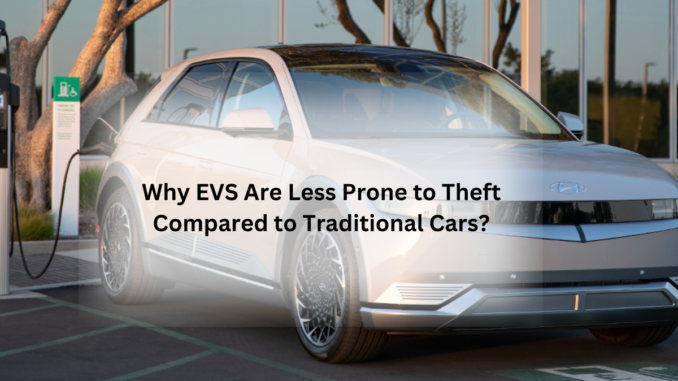
As the world transitions towards an additional reasonable future, we have massive additions to the automobile world. Let’s take the example of dash cams and how they have made driving easy, especially at night.
However, the greatest and most revolutionary invention in the automobile world is the Electric Vehicle or EV.
EVs have several advantages over conventional automobiles in addition to their positive impact on the environment: They are less likely to be stolen. Even though car theft is still a problem, EVs are less of a target for thieves thanks to their distinctive features and technological advancements.
In this article, we will investigate the justifications for why EVs are less inclined to robbery than conventional vehicles, featuring the key security elements and qualities that add to their expanded security.
EVS Are Less Prone to Theft Compared to Traditional Cars?
Are electric cars harder to steal? The answer is yes.
Here are five reasons why EVS are harder to steal compared to traditional cars.
1. Keyless Passage and Start System
EVs are less inclined to robbery because of the high-level keyless section and beginning frameworks they integrate. In contrast to conventional automobiles, electric vehicles frequently use smartphone apps or electronic key fobs to unlock and start the car.
Since these systems use encrypted signals that are difficult to duplicate or intercept, it is easier for thieves to get into the car with permission.
Biometric authentication, which requires the owner’s fingerprint or face recognition for ignition, is another security feature many EVs offer.
2. Upgraded Tracking and Recovery System
Present-day EVs are outfitted with cutting-edge following and recuperation frameworks, making them more straightforward to situate in case of robbery.
Numerous EV makers offer coordinated GPS following innovation, permitting proprietors and policing to follow the taken vehicle’s accurate area.
Additionally, some EV models come with remote immobilization systems that prevent the thief from escaping by allowing the owner or law enforcement to disable the vehicle remotely.
This powerful enemy of burglary frameworks not just increment the possibilities of recuperating the taken EV yet additionally go about as areas of strength against robbery endeavors.
3. Unique Vehicle Identification and Serialization
EVs frequently have serialization and unique vehicle identification numbers (VINs) stored in the vehicle’s electronic control units.
Because they can be tracked and verified by law enforcement agencies, these identifiers provide an additional layer of security.
In a burglary, the VIN can be used to alarm specialists and forestall the deceitful resale of the taken EV. Additionally, EVs may have unique labeling on significant components and tamper-proof screws, making it harder for thieves to disassemble and sell the stolen parts.
4. Limited Demand for EV Parts in the Aftermarket
In contrast to conventional automobiles, there is a relatively limited demand for EV parts in the aftermarket. EVs’ specialized parts won’t work with other vehicles because they were made just for their models.
This makes stolen EV parts less appealing to thieves because they have a lower market value and are less desirable.
Additionally, genuine OEM (Original Equipment Manufacturer) parts for EVs are becoming increasingly readily available, making obtaining genuine replacement parts more accessible and less expensive.
5. Increased Public Awareness and Concern for Safety
As EVs gain popularity, more people know their security features and are less likely to be stolen. Proprietors of EVs are bound to be aware of their vehicle’s security and play it safe, for example, utilizing secure leaving offices, introducing home charging stations in certain regions, and using extra actual enemy of burglary gadgets like guiding wheel locks.
EVs are less of a target for thieves due to this increased security consciousness and collective deterrent effect.
Conclusion
While vehicle robbery stays a worry in the present society, electric vehicles (EVs) offer improved security highlights and mechanical headways that make them less inclined to burglary contrasted with conventional cars.
Keyless passage and begin frameworks, high-level following and recuperation frameworks, attractive vehicle recognizable proof and serialization, restricted secondary selling interest for EV parts, and more prominent public mindfulness and security awareness all add to the expanded well-being of EVs.
Manufacturers are expected to continue innovating and improving security measures to provide car owners with peace of mind and safeguard their valuable assets as EV adoption continues to rise.
